Sustainability of Mega Events Essay
VerifiedAdded on 2021/02/20
|7
|2254
|34
AI Summary
Contribute Materials
Your contribution can guide someone’s learning journey. Share your
documents today.

Mega events
Secure Best Marks with AI Grader
Need help grading? Try our AI Grader for instant feedback on your assignments.
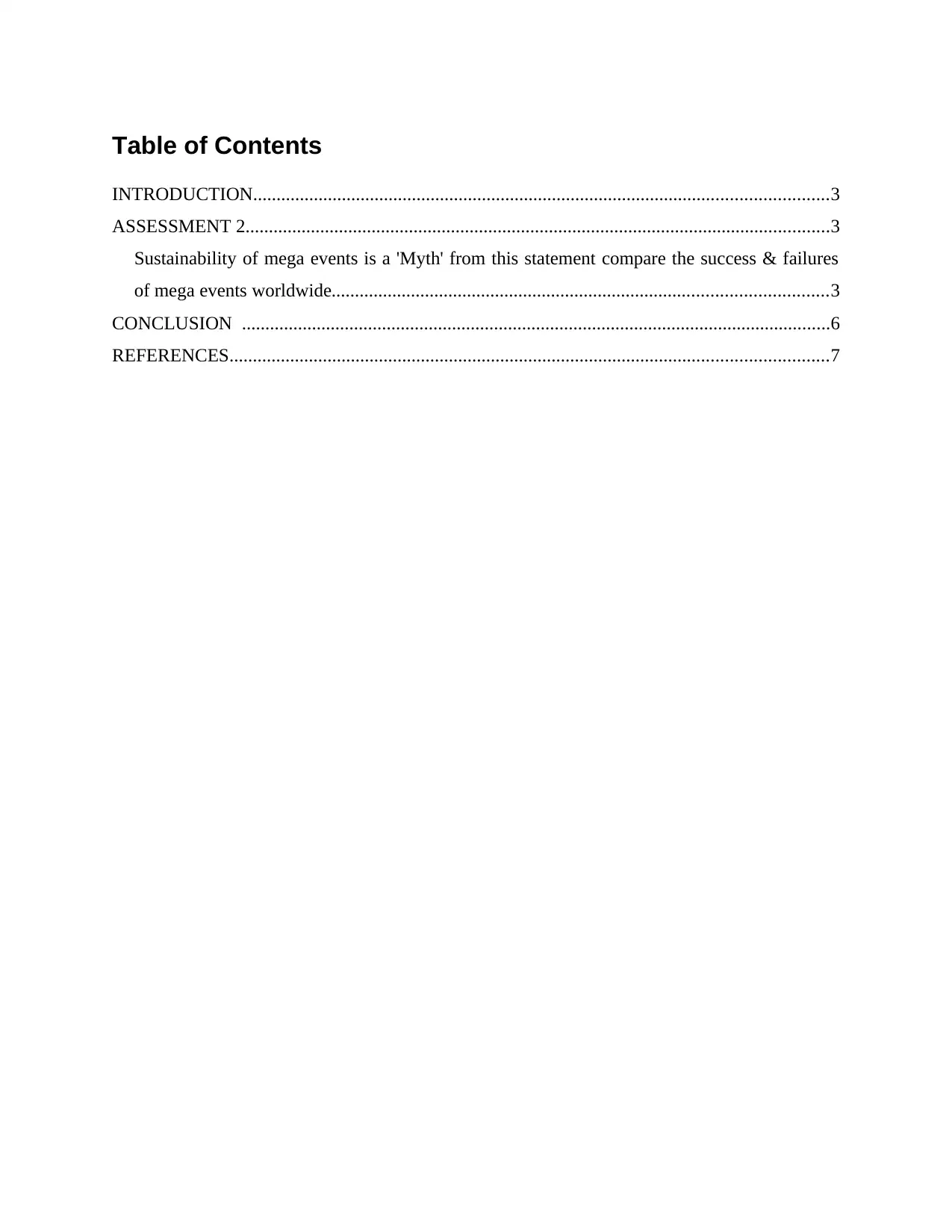
Table of Contents
INTRODUCTION...........................................................................................................................3
ASSESSMENT 2.............................................................................................................................3
Sustainability of mega events is a 'Myth' from this statement compare the success & failures
of mega events worldwide..........................................................................................................3
CONCLUSION ..............................................................................................................................6
REFERENCES................................................................................................................................7
INTRODUCTION...........................................................................................................................3
ASSESSMENT 2.............................................................................................................................3
Sustainability of mega events is a 'Myth' from this statement compare the success & failures
of mega events worldwide..........................................................................................................3
CONCLUSION ..............................................................................................................................6
REFERENCES................................................................................................................................7
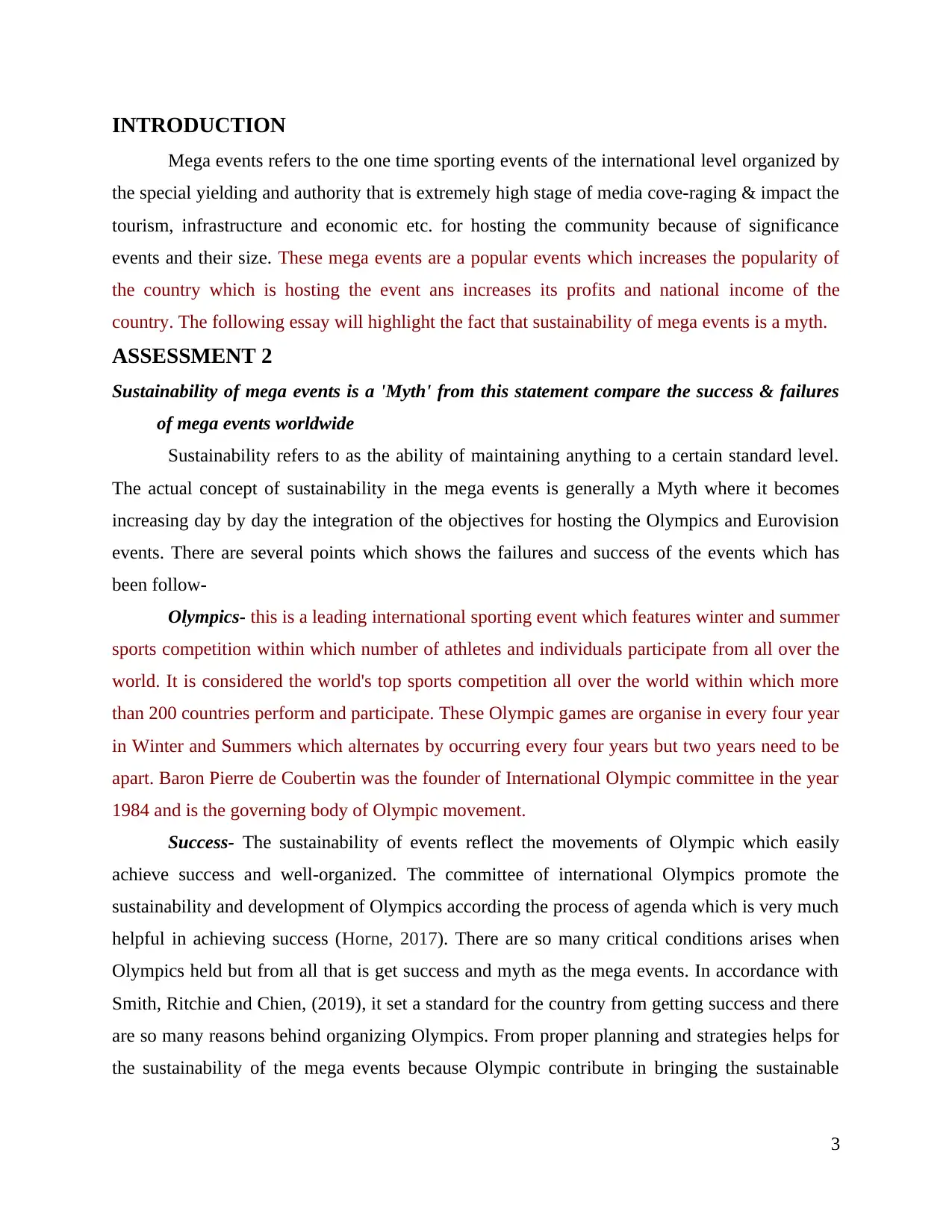
INTRODUCTION
Mega events refers to the one time sporting events of the international level organized by
the special yielding and authority that is extremely high stage of media cove-raging & impact the
tourism, infrastructure and economic etc. for hosting the community because of significance
events and their size. These mega events are a popular events which increases the popularity of
the country which is hosting the event ans increases its profits and national income of the
country. The following essay will highlight the fact that sustainability of mega events is a myth.
ASSESSMENT 2
Sustainability of mega events is a 'Myth' from this statement compare the success & failures
of mega events worldwide
Sustainability refers to as the ability of maintaining anything to a certain standard level.
The actual concept of sustainability in the mega events is generally a Myth where it becomes
increasing day by day the integration of the objectives for hosting the Olympics and Eurovision
events. There are several points which shows the failures and success of the events which has
been follow-
Olympics- this is a leading international sporting event which features winter and summer
sports competition within which number of athletes and individuals participate from all over the
world. It is considered the world's top sports competition all over the world within which more
than 200 countries perform and participate. These Olympic games are organise in every four year
in Winter and Summers which alternates by occurring every four years but two years need to be
apart. Baron Pierre de Coubertin was the founder of International Olympic committee in the year
1984 and is the governing body of Olympic movement.
Success- The sustainability of events reflect the movements of Olympic which easily
achieve success and well-organized. The committee of international Olympics promote the
sustainability and development of Olympics according the process of agenda which is very much
helpful in achieving success (Horne, 2017). There are so many critical conditions arises when
Olympics held but from all that is get success and myth as the mega events. In accordance with
Smith, Ritchie and Chien, (2019), it set a standard for the country from getting success and there
are so many reasons behind organizing Olympics. From proper planning and strategies helps for
the sustainability of the mega events because Olympic contribute in bringing the sustainable
3
Mega events refers to the one time sporting events of the international level organized by
the special yielding and authority that is extremely high stage of media cove-raging & impact the
tourism, infrastructure and economic etc. for hosting the community because of significance
events and their size. These mega events are a popular events which increases the popularity of
the country which is hosting the event ans increases its profits and national income of the
country. The following essay will highlight the fact that sustainability of mega events is a myth.
ASSESSMENT 2
Sustainability of mega events is a 'Myth' from this statement compare the success & failures
of mega events worldwide
Sustainability refers to as the ability of maintaining anything to a certain standard level.
The actual concept of sustainability in the mega events is generally a Myth where it becomes
increasing day by day the integration of the objectives for hosting the Olympics and Eurovision
events. There are several points which shows the failures and success of the events which has
been follow-
Olympics- this is a leading international sporting event which features winter and summer
sports competition within which number of athletes and individuals participate from all over the
world. It is considered the world's top sports competition all over the world within which more
than 200 countries perform and participate. These Olympic games are organise in every four year
in Winter and Summers which alternates by occurring every four years but two years need to be
apart. Baron Pierre de Coubertin was the founder of International Olympic committee in the year
1984 and is the governing body of Olympic movement.
Success- The sustainability of events reflect the movements of Olympic which easily
achieve success and well-organized. The committee of international Olympics promote the
sustainability and development of Olympics according the process of agenda which is very much
helpful in achieving success (Horne, 2017). There are so many critical conditions arises when
Olympics held but from all that is get success and myth as the mega events. In accordance with
Smith, Ritchie and Chien, (2019), it set a standard for the country from getting success and there
are so many reasons behind organizing Olympics. From proper planning and strategies helps for
the sustainability of the mega events because Olympic contribute in bringing the sustainable
3
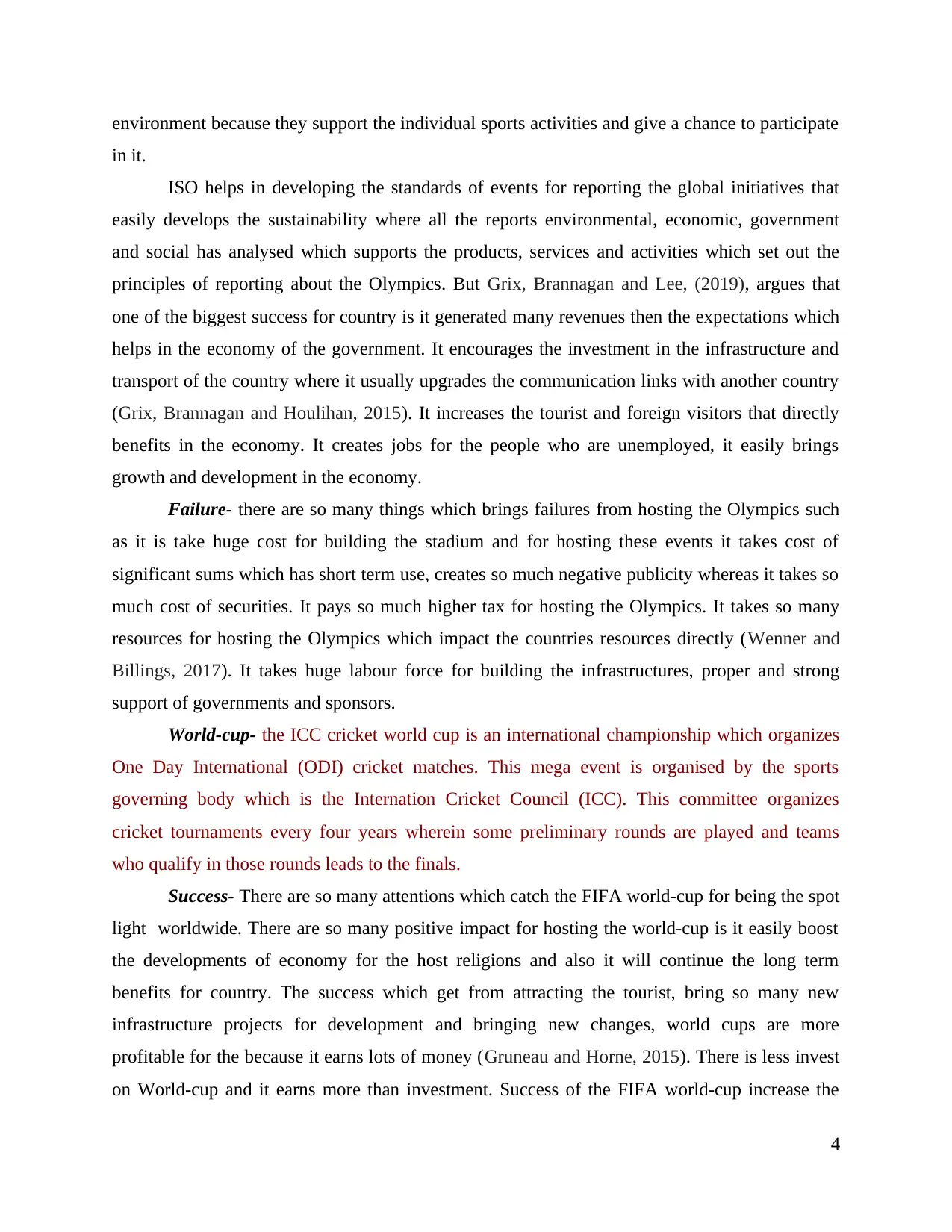
environment because they support the individual sports activities and give a chance to participate
in it.
ISO helps in developing the standards of events for reporting the global initiatives that
easily develops the sustainability where all the reports environmental, economic, government
and social has analysed which supports the products, services and activities which set out the
principles of reporting about the Olympics. But Grix, Brannagan and Lee, (2019), argues that
one of the biggest success for country is it generated many revenues then the expectations which
helps in the economy of the government. It encourages the investment in the infrastructure and
transport of the country where it usually upgrades the communication links with another country
(Grix, Brannagan and Houlihan, 2015). It increases the tourist and foreign visitors that directly
benefits in the economy. It creates jobs for the people who are unemployed, it easily brings
growth and development in the economy.
Failure- there are so many things which brings failures from hosting the Olympics such
as it is take huge cost for building the stadium and for hosting these events it takes cost of
significant sums which has short term use, creates so much negative publicity whereas it takes so
much cost of securities. It pays so much higher tax for hosting the Olympics. It takes so many
resources for hosting the Olympics which impact the countries resources directly (Wenner and
Billings, 2017). It takes huge labour force for building the infrastructures, proper and strong
support of governments and sponsors.
World-cup- the ICC cricket world cup is an international championship which organizes
One Day International (ODI) cricket matches. This mega event is organised by the sports
governing body which is the Internation Cricket Council (ICC). This committee organizes
cricket tournaments every four years wherein some preliminary rounds are played and teams
who qualify in those rounds leads to the finals.
Success- There are so many attentions which catch the FIFA world-cup for being the spot
light worldwide. There are so many positive impact for hosting the world-cup is it easily boost
the developments of economy for the host religions and also it will continue the long term
benefits for country. The success which get from attracting the tourist, bring so many new
infrastructure projects for development and bringing new changes, world cups are more
profitable for the because it earns lots of money (Gruneau and Horne, 2015). There is less invest
on World-cup and it earns more than investment. Success of the FIFA world-cup increase the
4
in it.
ISO helps in developing the standards of events for reporting the global initiatives that
easily develops the sustainability where all the reports environmental, economic, government
and social has analysed which supports the products, services and activities which set out the
principles of reporting about the Olympics. But Grix, Brannagan and Lee, (2019), argues that
one of the biggest success for country is it generated many revenues then the expectations which
helps in the economy of the government. It encourages the investment in the infrastructure and
transport of the country where it usually upgrades the communication links with another country
(Grix, Brannagan and Houlihan, 2015). It increases the tourist and foreign visitors that directly
benefits in the economy. It creates jobs for the people who are unemployed, it easily brings
growth and development in the economy.
Failure- there are so many things which brings failures from hosting the Olympics such
as it is take huge cost for building the stadium and for hosting these events it takes cost of
significant sums which has short term use, creates so much negative publicity whereas it takes so
much cost of securities. It pays so much higher tax for hosting the Olympics. It takes so many
resources for hosting the Olympics which impact the countries resources directly (Wenner and
Billings, 2017). It takes huge labour force for building the infrastructures, proper and strong
support of governments and sponsors.
World-cup- the ICC cricket world cup is an international championship which organizes
One Day International (ODI) cricket matches. This mega event is organised by the sports
governing body which is the Internation Cricket Council (ICC). This committee organizes
cricket tournaments every four years wherein some preliminary rounds are played and teams
who qualify in those rounds leads to the finals.
Success- There are so many attentions which catch the FIFA world-cup for being the spot
light worldwide. There are so many positive impact for hosting the world-cup is it easily boost
the developments of economy for the host religions and also it will continue the long term
benefits for country. The success which get from attracting the tourist, bring so many new
infrastructure projects for development and bringing new changes, world cups are more
profitable for the because it earns lots of money (Gruneau and Horne, 2015). There is less invest
on World-cup and it earns more than investment. Success of the FIFA world-cup increase the
4
Secure Best Marks with AI Grader
Need help grading? Try our AI Grader for instant feedback on your assignments.
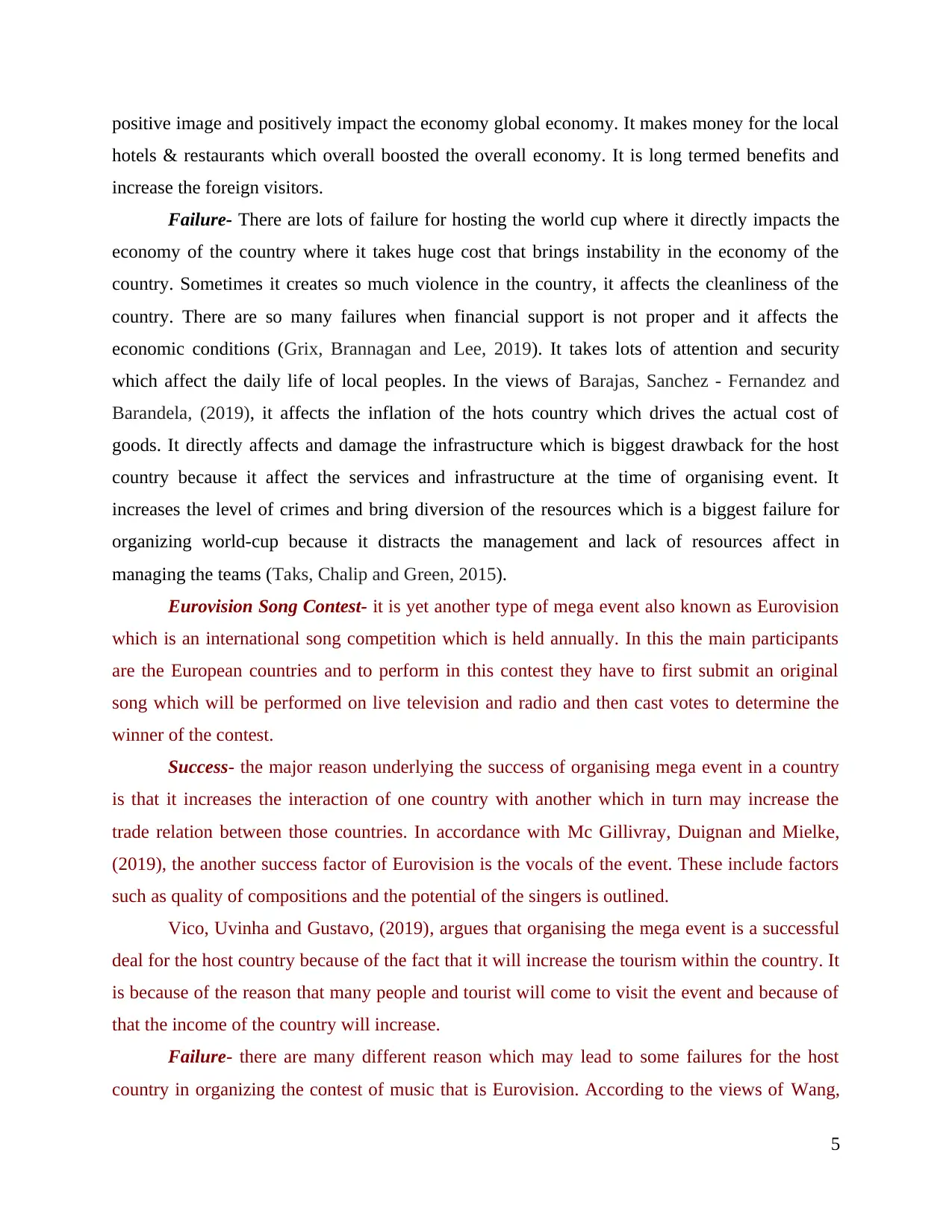
positive image and positively impact the economy global economy. It makes money for the local
hotels & restaurants which overall boosted the overall economy. It is long termed benefits and
increase the foreign visitors.
Failure- There are lots of failure for hosting the world cup where it directly impacts the
economy of the country where it takes huge cost that brings instability in the economy of the
country. Sometimes it creates so much violence in the country, it affects the cleanliness of the
country. There are so many failures when financial support is not proper and it affects the
economic conditions (Grix, Brannagan and Lee, 2019). It takes lots of attention and security
which affect the daily life of local peoples. In the views of Barajas, Sanchez - Fernandez and
Barandela, (2019), it affects the inflation of the hots country which drives the actual cost of
goods. It directly affects and damage the infrastructure which is biggest drawback for the host
country because it affect the services and infrastructure at the time of organising event. It
increases the level of crimes and bring diversion of the resources which is a biggest failure for
organizing world-cup because it distracts the management and lack of resources affect in
managing the teams (Taks, Chalip and Green, 2015).
Eurovision Song Contest- it is yet another type of mega event also known as Eurovision
which is an international song competition which is held annually. In this the main participants
are the European countries and to perform in this contest they have to first submit an original
song which will be performed on live television and radio and then cast votes to determine the
winner of the contest.
Success- the major reason underlying the success of organising mega event in a country
is that it increases the interaction of one country with another which in turn may increase the
trade relation between those countries. In accordance with Mc Gillivray, Duignan and Mielke,
(2019), the another success factor of Eurovision is the vocals of the event. These include factors
such as quality of compositions and the potential of the singers is outlined.
Vico, Uvinha and Gustavo, (2019), argues that organising the mega event is a successful
deal for the host country because of the fact that it will increase the tourism within the country. It
is because of the reason that many people and tourist will come to visit the event and because of
that the income of the country will increase.
Failure- there are many different reason which may lead to some failures for the host
country in organizing the contest of music that is Eurovision. According to the views of Wang,
5
hotels & restaurants which overall boosted the overall economy. It is long termed benefits and
increase the foreign visitors.
Failure- There are lots of failure for hosting the world cup where it directly impacts the
economy of the country where it takes huge cost that brings instability in the economy of the
country. Sometimes it creates so much violence in the country, it affects the cleanliness of the
country. There are so many failures when financial support is not proper and it affects the
economic conditions (Grix, Brannagan and Lee, 2019). It takes lots of attention and security
which affect the daily life of local peoples. In the views of Barajas, Sanchez - Fernandez and
Barandela, (2019), it affects the inflation of the hots country which drives the actual cost of
goods. It directly affects and damage the infrastructure which is biggest drawback for the host
country because it affect the services and infrastructure at the time of organising event. It
increases the level of crimes and bring diversion of the resources which is a biggest failure for
organizing world-cup because it distracts the management and lack of resources affect in
managing the teams (Taks, Chalip and Green, 2015).
Eurovision Song Contest- it is yet another type of mega event also known as Eurovision
which is an international song competition which is held annually. In this the main participants
are the European countries and to perform in this contest they have to first submit an original
song which will be performed on live television and radio and then cast votes to determine the
winner of the contest.
Success- the major reason underlying the success of organising mega event in a country
is that it increases the interaction of one country with another which in turn may increase the
trade relation between those countries. In accordance with Mc Gillivray, Duignan and Mielke,
(2019), the another success factor of Eurovision is the vocals of the event. These include factors
such as quality of compositions and the potential of the singers is outlined.
Vico, Uvinha and Gustavo, (2019), argues that organising the mega event is a successful
deal for the host country because of the fact that it will increase the tourism within the country. It
is because of the reason that many people and tourist will come to visit the event and because of
that the income of the country will increase.
Failure- there are many different reason which may lead to some failures for the host
country in organizing the contest of music that is Eurovision. According to the views of Wang,
5
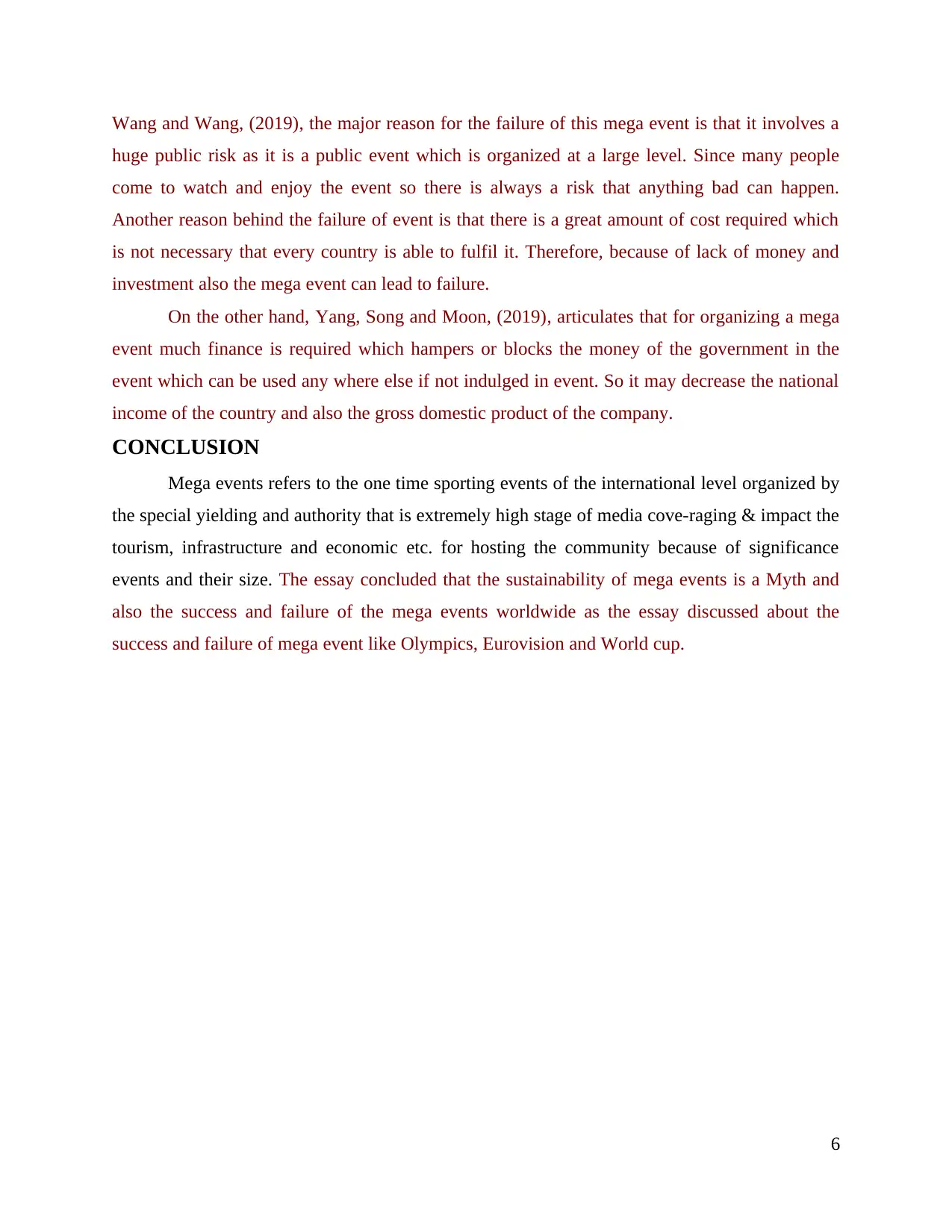
Wang and Wang, (2019), the major reason for the failure of this mega event is that it involves a
huge public risk as it is a public event which is organized at a large level. Since many people
come to watch and enjoy the event so there is always a risk that anything bad can happen.
Another reason behind the failure of event is that there is a great amount of cost required which
is not necessary that every country is able to fulfil it. Therefore, because of lack of money and
investment also the mega event can lead to failure.
On the other hand, Yang, Song and Moon, (2019), articulates that for organizing a mega
event much finance is required which hampers or blocks the money of the government in the
event which can be used any where else if not indulged in event. So it may decrease the national
income of the country and also the gross domestic product of the company.
CONCLUSION
Mega events refers to the one time sporting events of the international level organized by
the special yielding and authority that is extremely high stage of media cove-raging & impact the
tourism, infrastructure and economic etc. for hosting the community because of significance
events and their size. The essay concluded that the sustainability of mega events is a Myth and
also the success and failure of the mega events worldwide as the essay discussed about the
success and failure of mega event like Olympics, Eurovision and World cup.
6
huge public risk as it is a public event which is organized at a large level. Since many people
come to watch and enjoy the event so there is always a risk that anything bad can happen.
Another reason behind the failure of event is that there is a great amount of cost required which
is not necessary that every country is able to fulfil it. Therefore, because of lack of money and
investment also the mega event can lead to failure.
On the other hand, Yang, Song and Moon, (2019), articulates that for organizing a mega
event much finance is required which hampers or blocks the money of the government in the
event which can be used any where else if not indulged in event. So it may decrease the national
income of the country and also the gross domestic product of the company.
CONCLUSION
Mega events refers to the one time sporting events of the international level organized by
the special yielding and authority that is extremely high stage of media cove-raging & impact the
tourism, infrastructure and economic etc. for hosting the community because of significance
events and their size. The essay concluded that the sustainability of mega events is a Myth and
also the success and failure of the mega events worldwide as the essay discussed about the
success and failure of mega event like Olympics, Eurovision and World cup.
6
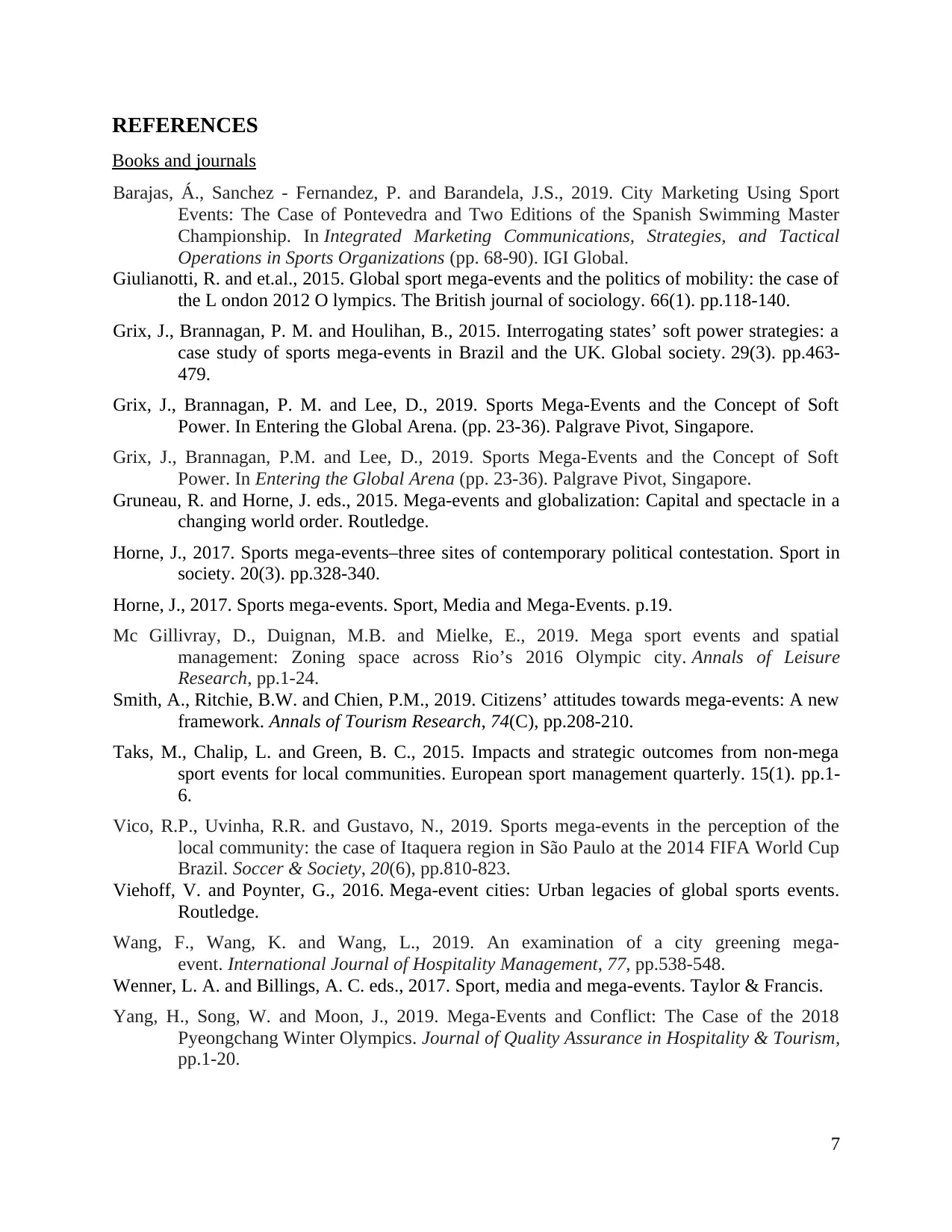
REFERENCES
Books and journals
Barajas, Á., Sanchez - Fernandez, P. and Barandela, J.S., 2019. City Marketing Using Sport
Events: The Case of Pontevedra and Two Editions of the Spanish Swimming Master
Championship. In Integrated Marketing Communications, Strategies, and Tactical
Operations in Sports Organizations (pp. 68-90). IGI Global.
Giulianotti, R. and et.al., 2015. Global sport mega‐events and the politics of mobility: the case of
the L ondon 2012 O lympics. The British journal of sociology. 66(1). pp.118-140.
Grix, J., Brannagan, P. M. and Houlihan, B., 2015. Interrogating states’ soft power strategies: a
case study of sports mega-events in Brazil and the UK. Global society. 29(3). pp.463-
479.
Grix, J., Brannagan, P. M. and Lee, D., 2019. Sports Mega-Events and the Concept of Soft
Power. In Entering the Global Arena. (pp. 23-36). Palgrave Pivot, Singapore.
Grix, J., Brannagan, P.M. and Lee, D., 2019. Sports Mega-Events and the Concept of Soft
Power. In Entering the Global Arena (pp. 23-36). Palgrave Pivot, Singapore.
Gruneau, R. and Horne, J. eds., 2015. Mega-events and globalization: Capital and spectacle in a
changing world order. Routledge.
Horne, J., 2017. Sports mega-events–three sites of contemporary political contestation. Sport in
society. 20(3). pp.328-340.
Horne, J., 2017. Sports mega-events. Sport, Media and Mega-Events. p.19.
Mc Gillivray, D., Duignan, M.B. and Mielke, E., 2019. Mega sport events and spatial
management: Zoning space across Rio’s 2016 Olympic city. Annals of Leisure
Research, pp.1-24.
Smith, A., Ritchie, B.W. and Chien, P.M., 2019. Citizens’ attitudes towards mega-events: A new
framework. Annals of Tourism Research, 74(C), pp.208-210.
Taks, M., Chalip, L. and Green, B. C., 2015. Impacts and strategic outcomes from non-mega
sport events for local communities. European sport management quarterly. 15(1). pp.1-
6.
Vico, R.P., Uvinha, R.R. and Gustavo, N., 2019. Sports mega-events in the perception of the
local community: the case of Itaquera region in São Paulo at the 2014 FIFA World Cup
Brazil. Soccer & Society, 20(6), pp.810-823.
Viehoff, V. and Poynter, G., 2016. Mega-event cities: Urban legacies of global sports events.
Routledge.
Wang, F., Wang, K. and Wang, L., 2019. An examination of a city greening mega-
event. International Journal of Hospitality Management, 77, pp.538-548.
Wenner, L. A. and Billings, A. C. eds., 2017. Sport, media and mega-events. Taylor & Francis.
Yang, H., Song, W. and Moon, J., 2019. Mega-Events and Conflict: The Case of the 2018
Pyeongchang Winter Olympics. Journal of Quality Assurance in Hospitality & Tourism,
pp.1-20.
7
Books and journals
Barajas, Á., Sanchez - Fernandez, P. and Barandela, J.S., 2019. City Marketing Using Sport
Events: The Case of Pontevedra and Two Editions of the Spanish Swimming Master
Championship. In Integrated Marketing Communications, Strategies, and Tactical
Operations in Sports Organizations (pp. 68-90). IGI Global.
Giulianotti, R. and et.al., 2015. Global sport mega‐events and the politics of mobility: the case of
the L ondon 2012 O lympics. The British journal of sociology. 66(1). pp.118-140.
Grix, J., Brannagan, P. M. and Houlihan, B., 2015. Interrogating states’ soft power strategies: a
case study of sports mega-events in Brazil and the UK. Global society. 29(3). pp.463-
479.
Grix, J., Brannagan, P. M. and Lee, D., 2019. Sports Mega-Events and the Concept of Soft
Power. In Entering the Global Arena. (pp. 23-36). Palgrave Pivot, Singapore.
Grix, J., Brannagan, P.M. and Lee, D., 2019. Sports Mega-Events and the Concept of Soft
Power. In Entering the Global Arena (pp. 23-36). Palgrave Pivot, Singapore.
Gruneau, R. and Horne, J. eds., 2015. Mega-events and globalization: Capital and spectacle in a
changing world order. Routledge.
Horne, J., 2017. Sports mega-events–three sites of contemporary political contestation. Sport in
society. 20(3). pp.328-340.
Horne, J., 2017. Sports mega-events. Sport, Media and Mega-Events. p.19.
Mc Gillivray, D., Duignan, M.B. and Mielke, E., 2019. Mega sport events and spatial
management: Zoning space across Rio’s 2016 Olympic city. Annals of Leisure
Research, pp.1-24.
Smith, A., Ritchie, B.W. and Chien, P.M., 2019. Citizens’ attitudes towards mega-events: A new
framework. Annals of Tourism Research, 74(C), pp.208-210.
Taks, M., Chalip, L. and Green, B. C., 2015. Impacts and strategic outcomes from non-mega
sport events for local communities. European sport management quarterly. 15(1). pp.1-
6.
Vico, R.P., Uvinha, R.R. and Gustavo, N., 2019. Sports mega-events in the perception of the
local community: the case of Itaquera region in São Paulo at the 2014 FIFA World Cup
Brazil. Soccer & Society, 20(6), pp.810-823.
Viehoff, V. and Poynter, G., 2016. Mega-event cities: Urban legacies of global sports events.
Routledge.
Wang, F., Wang, K. and Wang, L., 2019. An examination of a city greening mega-
event. International Journal of Hospitality Management, 77, pp.538-548.
Wenner, L. A. and Billings, A. C. eds., 2017. Sport, media and mega-events. Taylor & Francis.
Yang, H., Song, W. and Moon, J., 2019. Mega-Events and Conflict: The Case of the 2018
Pyeongchang Winter Olympics. Journal of Quality Assurance in Hospitality & Tourism,
pp.1-20.
7
1 out of 7
Related Documents
Your All-in-One AI-Powered Toolkit for Academic Success.
+13062052269
info@desklib.com
Available 24*7 on WhatsApp / Email
![[object Object]](/_next/static/media/star-bottom.7253800d.svg)
Unlock your academic potential
© 2024 | Zucol Services PVT LTD | All rights reserved.





